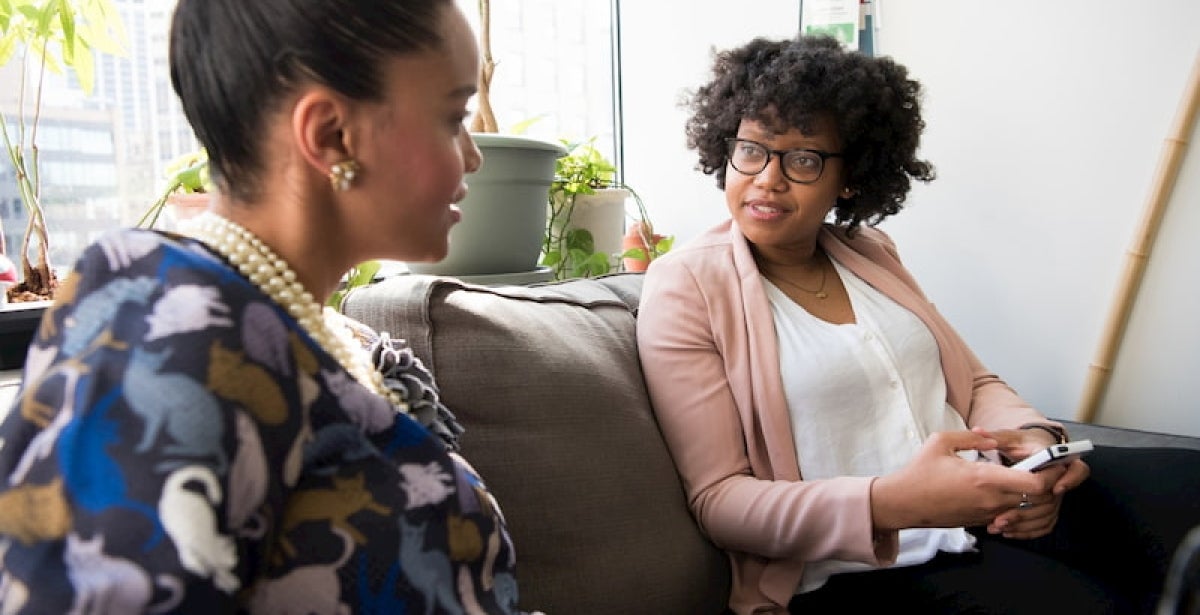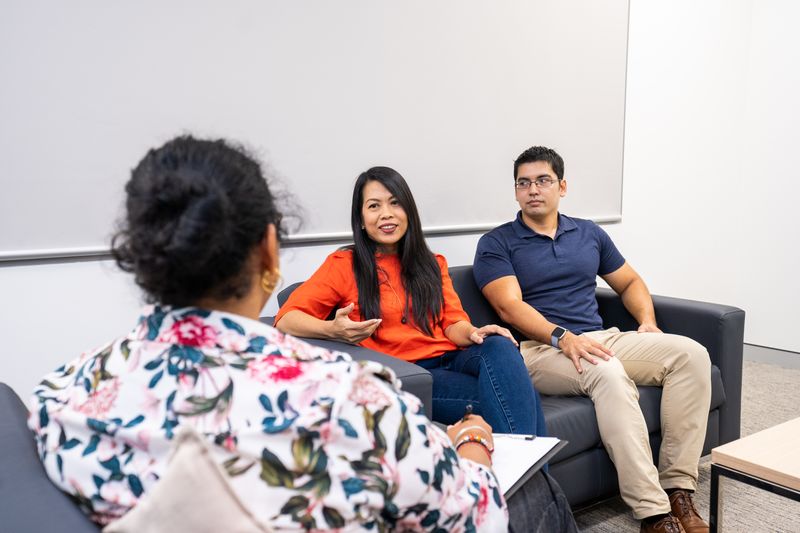
5 Reasons Why You Should Study a Master of Counselling
Life is hard – for a bucket of reasons.
In fact, some would argue that since the 1980s the world has become more complex than it used to be. Major shifts in technology and society have created waves of disruption. And while humans have had to wrestle with constant change, they’ve also continued to deal with all manner of difficult issues – from relationship problems to workplace discrimination and natural disasters.
Sustained struggles and dealing with adversity – whether individually or collectively – have created a real need for support and strategies. There’s an uptick in demand from people wanting to be heard and validated.
This trend is reflected in the increasing job opportunities available for counsellors, with an almost 25 per cent projected employment growth over the next five years.
What’s more, those figures don’t take into account the biggest curveball of the last century – the COVID-19 pandemic. With nobody immune, this shared trauma impacted economic and social wellbeing worldwide. In Australia, Lifeline crisis support counsellors received more calls for help than any other time in the organisation’s 57-year history.
It’s clear that the need for counselling skills is greater than ever. Here are five reasons why studying a Master of Counselling can help your career.
1. Grow your career options
Counselling skills can begin your career, or enhance it, in a range of areas.

Work as a counsellor
Traditionally, a counsellor is someone who provides talked-based therapy when we experience personal challenges. Counsellors act as a guide to help people deal with many issues, including grief, low self-esteem, parenting difficulties, addiction problems, abuse, trauma and general stress. In fact, these are just some of the trials and tribulations that counsellors focus their efforts on.
“When a person can let you into their world and feel safe enough to bring down their barriers, boundaries or defences and say this is a raw part of me that I haven't shared with someone else, or I haven't even allowed myself to recognise within myself, it's such a privilege as a counsellor.”
But counselling skills can also be put into practice across many other industries.
Apply to your person-centred role
If you work with people, a qualification in counselling could give you an interpersonal edge by developing your ability to listen, connect, empathise and support.
According to Georgina Akers, ECU’s Course Coordinator of the Master of Counselling, counselling skills can help you shine in many industries, including the healthcare sector and education.
Describing educators as people working at the “pointy end of life”, Georgina explains how beneficial the person-centred skills found in counselling can be inside the classroom.
“Working with children, it’s clear we've been conditioned to think that behaviour is good or bad. We've often had labels for children, such as ‘that child is naughty.’ But if we can really consider behaviour as a symptom for an emotional need, and link that to their stage of development, we have a better understanding of what's happening for that person.
When we're able to look at their strengths and build on their strengths, we can empower them to be heard and make positive choices that are relevant to them.”
Counselling skills can also play an important role in the world of business. Managers and team leaders can create engaged, motivated and productive workplaces through the principles of counselling.
Georgina says, “You get the best out of people when they're self-driven, rather than when they're being told what to do or when they feel like they're being micromanaged. People achieve their full potential when they are given some autonomy to direct themselves.”
2. Engage in work that helps others
Counselling skills can help you step into work that makes positive change in the lives of people around you. And the change is broader than you might think.
“Counselling has the ability to make some really positive changes in the lives of individuals, families and communities,” Georgina says.

Community work
In early 2020, Australia was devastated by catastrophic bushfires. The fires that ripped through the nation took human lives, killed nearly three billion animals, decimated property and destroyed livelihoods. The impact of the crisis was thought to have sparked “collective trauma”, with communities in a state of shock.
“Communities that have been devastated by bushfires could have counsellors connect with community members and facilitate sessions where they feel heard. They’re able to grieve and talk about their frustrations or their anger. This collaborative healing can be so much more powerful than seeing an individual.
“Community counselling is a growing approach and highlights the importance of going beyond individualist assessments and interventions to work towards a more holistic approach that considers the person in context.”
Work with the vulnerable
Aside from tragedies like bushfires, counselling skills make a significant impact on the lives of our most vulnerable. In Australia, statistics show that Aboriginal and Torres Strait Islander peoples, teenagers and older adults are in need of the most support. By gaining counselling skills, Georgina says you can make a difference in the lives of others, and this in itself is rewarding.
“Most people that are drawn to the field of counselling have that inherent sense of wanting to help. They have natural empathy and the ability to connect with people. It’s such a privilege to be a counsellor, to connect with people and to be let into their world.
“It's such a fulfilling journey to go on with people. There's never a dull day,” she adds.
3. Benefit from a professional qualification
While helping people is hugely satisfying, in Georgina’s experience it can also be “difficult to walk alongside someone during their grief, or loss, or to hear stories of their torture or trauma.”
This is why a professional qualification like ECU’s Master of Counselling provides untold value.
Learn reflective practice
Georgina says the degree is designed so that you learn how to “sit in a place of discomfort and bear silence,” while understanding how to look after yourself.
This course does equip students with the ability to find a balance between being completely genuine, open and empathetic, but also the skills of protecting yourself.”
“There's a well-known phenomenon of vicarious trauma and a big aspect of our course is reflective practice, supervision and self-care,” explains Georgina.
For Georgina, avoiding being caught up in a web of problems was a big motivation for doing a Master of Counselling herself. While working in the prison system, she discovered that it’s very easy to take on other people’s troubles and risk burning out.
“I thought ‘I need some skills to know how to protect myself’, so that at the end of the day, when I go home to my two young girls and my family, I'm not traumatised by the experiences that I've been led into or that I’ve heard.”
Gain cultural awareness and sensitivity
Studying evidence-based theories, techniques and approaches that are current and relevant in the field of counselling also prepares you to respond to cultural differences and diverse needs.
“Students learn the skills of being multiculturally competent. Of being respectful and valuing diversity, and also being mindful of ethical and accountable practice.”
While most of us are likely to have potential blind spots when it comes to assessing others, Georgina outlines that the Master of Counselling breaks down biases.
“We teach students how to work within boundaries and structure, but within that, to have the flexibility to adapt and change, and to move with the client's needs.”
Build credibility and confidence
According to Georgina, a professional qualification also can give you a personal sense of professionalism, as well as added credibility in the eyes of clients. It also can offer “an extra level of validity.”
“You're eligible for membership or accreditation with certain bodies, which provide a consistent set of code of conduct and practitioner standards. So you are part of something that is making sure that you're delivering best practice.”
4. Choose from a range of specialisations
There are infinite possibilities when it comes to putting counselling skills into practice. Your potential areas of growth and development are virtually endless, meaning there’s little chance of feeling stagnant!
Some areas of specialisations include:
- Drugs and alcohol
- Family and marriage
- Children and adolescents
- Perinatal
- Oncology
- Palliative care
- Grief and loss
Some counsellors specialise in perinatal mental health, children and adolescents, oncology or palliative counselling.
The environment where you work can also vary greatly, ranging from schools and hospitals to an office or even a prison setting.

Existential therapy
With global events such as Covid-19, Georgina says mental health counselling has been pushed to the forefront. Unsurprising, given reports from Beyond Blue indicate website traffic increased by 65 per cent in 2020 compared to 2019.
According to Georgina, this historic moment has also made the specialisation of existential therapy more attractive. With an abrupt stop to the business-as-usual rat-race, she says more people are reflecting on and exploring the meaning of life.
She describes this sort of therapy as an exploration of the notion, “what’s my purpose and why am I here.”
“You don't have to go to counselling because you have a symptom, or because you're depressed, or because life's not great. It can actually be a really beautiful gift that you give to yourself. It can help us unpack what is stopping us from being fulfilled.”
5. Very strong job growth
Wherever you find people, you can find a counselling role. As individuals grapple with increasing challenges, counselling skills have become critical in helping them deal with their emotions effectively.
Hence, the job outlook for graduates with counselling expertise looks promising. Projections show more demand, with the main industries being in healthcare and social assistance, education and training, and public administration and safety.
ECU’s online Master of Counselling will give you tools to work with individuals and communities, and the opportunity to put your skills into practice on placement.
Learn more about ECU’s online Master of Counselling and call us today.



